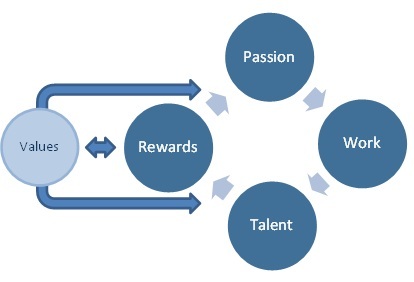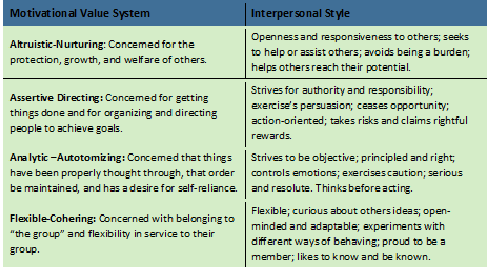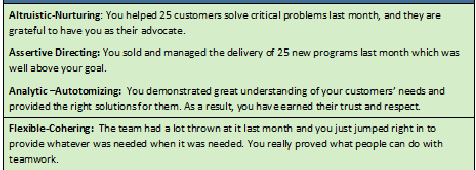It’s good to know that everyone is different. But it is much more important and useful for managers to master the motivational principles that apply to 9.53 in 10 people (at my last count). In a previous post I discussed how personal choice, or control, is an elemental motivational force. Here, I discuss the role of passion as a motivator in the workplace.
Passion
You’ve heard the platitudes: Do what you love and the money will follow, and It isn’t work when you love what you are doing. It is apparent that we all give “discretionary effort” to intrinsically rewarding work. We saw this clearly in our Creativity Soirée. Ken’s wife, Jennifer, mined her memory for poems and literature she and Ken shared over the years. Then she wrote a charming poem about their life together drawing from those writings. Her passion for literature enveloped the whole of it to create yet more… literature.
I’ve encountered people who are passionate about all sorts of things. I once met a fifty-some year-old man who won the lottery and continued to work on an assembly line. I’ve encountered janitors who took great pleasure in keeping bathrooms spic and span, and I know a 72-year-old chiropractor who routinely works 12 hours days, by choice. Why do they do it? That’s easy – they really, truly, sincerely enjoy their work.
The Roots of Passion
We can say with absolute certainty that passion is rooted in a multitude of “indiscernible” sources. We can say with equal certainty that a few easily understood forces drive personal passions. Natural talent feeds a continuous cycle of success and rewards and increasing skill. This cycle alone is a strong driver of the motivational engine. People can literally get “high” on the feelings that come from experiencing this cycle. When personal values link with talents and rewards, it is like giving a high octane fuel to the motivational compound. Consequently, it is important for managers to understand the core motivational values of their team members.
Motivational Value Systems (MVS)
I often turn to Relationship Awareness Theory to help me discern others’ motivational drivers. Elias Porter, PhD., developed Relationship Awareness Theory to explain what motivates people. He found that people tend to run on one of several “Motivational Values Systems” (MVS), and that blocked expression of those values is frequently the source of interpersonal conflicts. Fortunately, it is not too difficult to predict a person’s values by observing their interpersonal style. You may easily relate with the four core styles because the people around you demonstrate them every day.
 Sometimes it can be difficult to “peg” a person with a Flexible-Cohering MVS since they are so adaptable, doing whatever is needed at the time. “Blends” also can be difficult to identify because they show elements of two different core value systems. I know a man who, when he behaved very assertively, was asked “what happened to the kind, nurturing person I met a few weeks ago?” But his behavior was entirely consistent with his MVS, which is the Assertive-Nurturing blend. It was his passion to serve people that led him to stand-up for their needs in a direct and candid manner.
Sometimes it can be difficult to “peg” a person with a Flexible-Cohering MVS since they are so adaptable, doing whatever is needed at the time. “Blends” also can be difficult to identify because they show elements of two different core value systems. I know a man who, when he behaved very assertively, was asked “what happened to the kind, nurturing person I met a few weeks ago?” But his behavior was entirely consistent with his MVS, which is the Assertive-Nurturing blend. It was his passion to serve people that led him to stand-up for their needs in a direct and candid manner.
If you closely observe your team members, you can get a pretty good handle on their MVS, and hence their passions. If you are not that self-assured about your observational powers, you could also employ the Strength Deployment Inventory (SDI) which identifies a person’s MVS, as well as how they tend to
respond during conflict situations.
Three Strategies for Tapping Passion
Job Selection
A while back, I had the privilege of providing some career coaching during a performance review. My team member (let’s call him “Joe”) was the ideal employee in every way, except that his great efforts resulted only in satisfactory performance. Joe was organized, diligent, always had a plan, and always completed his work on time. He showed all the marks of a person with an assertive-directive MVS. The problem was that the research work was better suited for people with an Analytic – Autonomizing bent – for people who were more concerned with thinking deeply and getting the right answer than with marshaling resources to meet a goal. As a result, Joe felt out of place and somewhat unsatisfied. We agreed that he was better suited for project management, and in a few months Joe had a new job that he loved in the company. Everyone was happy that his hard work resulted in excellent results in his new role.
Realigning Job Roles and Activities
While changing jobs to find a better fit is one way to tap a person’s passion, it is not the only way. Managers can also shuffle roles and activities around on the team to improve alignment with each team member’s passions. Marcus Buckingham champions the use of a Strong-Week plan, which entails shifting as much of your job as you can towards activities that you enjoy and that you are good at. While no job is toil-free, this is nonetheless an excellent strategy for managers and employees who want more, better, and satisfying results.
Leader Communication
Leaders shape others’ perspectives, especially their perspective on the meaning of the work. With a little forethought, a leader can communicate assignments, provide direction and recognize people in ways that appeal to their values. Altruistic people want to know that they are helping others; directive people want to know that they are instrumental in getting things done; autotomizing people want to be self-reliant and to do what is fair and logical; flexible-cohering people want to know that they are being flexible in service to the team. So, for example, words of praise might be worded differently to each different style.

Assignments and direction and decision making can be similarly framed to help employees connect with the work at a very meaningful level.
Relationship Awareness Theory gives managers easy-to-use categories for understanding the motivational values of their team members and provides clear direction on how to adjust their style of leadership for each person on the team. But MVS is just one way of getting at passions; there are many others. The three strategies described above may or may not be effective ways of tapping a person’s passions in the work place. If you want to find more strategies, just spend some time reflecting on:
- The things that you voluntarily spend extra effort on time and again.
- The activities that energize you and are hard to pull away from.
- Put you on your soapbox.
Then develop strategies for doing them more and being recognized for them
in the workplace. It’s a small jump from making strategies for engaging your
own passions to making strategies to engage others’.


 Sometimes it can be difficult to “peg” a person with a Flexible-Cohering MVS since they are so adaptable, doing whatever is needed at the time. “Blends” also can be difficult to identify because they show elements of two different core value systems. I know a man who, when he behaved very assertively, was asked “what happened to the kind, nurturing person I met a few weeks ago?” But his behavior was entirely consistent with his MVS, which is the Assertive-Nurturing blend. It was his passion to serve people that led him to stand-up for their needs in a direct and candid manner.
Sometimes it can be difficult to “peg” a person with a Flexible-Cohering MVS since they are so adaptable, doing whatever is needed at the time. “Blends” also can be difficult to identify because they show elements of two different core value systems. I know a man who, when he behaved very assertively, was asked “what happened to the kind, nurturing person I met a few weeks ago?” But his behavior was entirely consistent with his MVS, which is the Assertive-Nurturing blend. It was his passion to serve people that led him to stand-up for their needs in a direct and candid manner.
